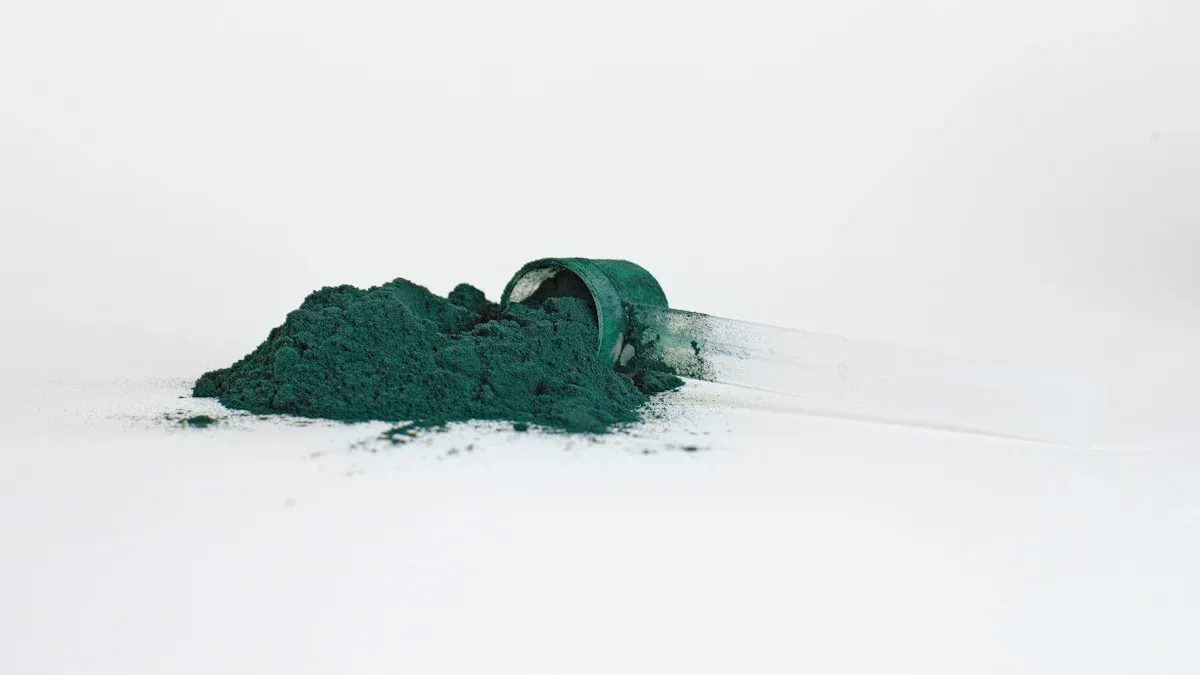Is Spirulina Safe for Hashimoto’s Patients
Table of Contents

You may find the Impact of Spirulina on hashimoto’s thyroiditis both promising and concerning.
- Side effects appear rare based on clinical research.
- You should consider iodine content, immune system effects, and product purity.
- Always talk to your healthcare provider before using spirulina.
Impact of Spirulina on Hashimoto’s

Antioxidant and Anti-Inflammatory Benefits
You may wonder about the impact of spirulina on your thyroid health, especially if you have Hashimoto’s. Many people look for ways to reduce oxidative stress and inflammation in the body. Spirulina stands out because it contains powerful antioxidants like phycocyanins and β-carotene. These compounds help protect your cells from damage.
- Spirulina has antioxidant properties that can help lower oxidative stress.
- Research shows that a specific polysaccharide from spirulina can reduce hypothyroidism in animal studies.
- Hypothyroidism, which often results from autoimmune conditions like Hashimoto’s, links closely to oxidative stress. This means spirulina may offer some therapeutic benefits.
You may also hear about the anti-inflammatory effects of spirulina. Some research suggests that spirulina can help reduce inflammation in the body. This could be helpful for people with autoimmune thyroid conditions, where inflammation often plays a big role.
When you compare spirulina to other supplements for thyroid health, you see that it has strong antioxidant abilities. Studies show that spirulina can protect against thyroid toxicity caused by fluoride. However, research does not directly compare spirulina’s antioxidant power to other common thyroid supplements. You should keep this in mind when choosing what is best for your health.
Immune System Effects
The impact of spirulina on the immune system is complex. You may read that spirulina can boost immune function. This sounds good, but for people with autoimmune diseases like Hashimoto’s, it can be risky. Your immune system already attacks your thyroid, so extra stimulation may cause problems.
Note: Some people with autoimmune conditions report feeling worse after taking spirulina. This is because their immune system becomes more active, which can trigger flare-ups.
Recent research highlights this risk. In one study, 47% of patients with dermatomyositis experienced immune flare-ups after using spirulina. Other studies and case reports link spirulina to immune activation, which can make autoimmune symptoms worse. There are reports of flares in conditions like lupus erythematosus and dermatomyositis after spirulina use.
| Condition | Risk of Immune Flare-Up with Spirulina |
|---|---|
| Dermatomyositis (DM) | 47% |
| Lupus Erythematosus | Documented cases |
Research shows that herbal supplements, including spirulina, can stimulate the immune system. For people with a history of autoimmune diseases, this may lead to immune flare-ups. You should be careful and talk to your healthcare provider before starting spirulina, especially if you have Hashimoto’s.
The impact of spirulina on Hashimoto’s is not simple. While you may benefit from its antioxidant and anti-inflammatory effects, the risk of immune activation is real. Always consider both sides and use research to guide your choices.
Spirulina Risks and Precautions

Iodine Content Concerns
You may think spirulina is a safe superfood for thyroid health, but you need to pay close attention to its iodine content. Most commercially available spirulina supplements contain about 15mcg of iodine per 3-gram serving. This amount is only about 10% of the recommended daily intake for adults, which is 150mcg. Spirulina does not add as much iodine to your diet as kelp or other sea vegetables.
- Typical daily serving (3g) of spirulina: 15mcg iodine
- US recommended daily intake: 150mcg iodine
- Spirulina is a minor source of iodine compared to kelp
Even though spirulina has low iodine, you should still be careful. People with autoimmune thyroid disease, like Hashimoto’s, can react strongly to even small increases in iodine. Clinical reports show that high iodine intake can raise thyroid antibodies and worsen symptoms. For example:
- A woman taking kelp tablets had a big increase in thyroid antibodies and a drop in TSH, which made her thyroid health worse.
- Another woman developed both hyper- and hypothyroid symptoms after high-dose iodine therapy, leading to a diagnosis of Graves’ disease.
- In one study, 80% of Hashimoto’s patients who avoided iodine completely reached remission of their symptoms.
Doctors recommend that people with autoimmune diseases avoid iodine supplements above 500mcg daily. The upper safe limit is 1,100mcg, but even lower amounts can cause problems for sensitive individuals. Many healthcare providers do not recommend spirulina for people with autoimmune thyroid disease because of the risk of raising thyroid antibodies and making symptoms worse. Some clients have even linked the start of their autoimmune thyroid disease to high iodine intake from spirulina.
Contamination and Purity Issues
You need to know that spirulina supplements can carry risks beyond iodine. Contamination is a serious concern for anyone with thyroid disease or autoimmune conditions. Spirulina can become contaminated with heavy metals, microcystins (toxins from blue-green algae), and harmful bacteria if grown in unclean environments.
- Microcystins are common in blue-green algae supplements, including spirulina.
- Contamination by toxin-producing species can happen when spirulina is grown in natural waters without strict quality controls.
- Independent tests have found variable levels of microcystins and heavy metals in spirulina products.
- Some studies focus on a single toxin, MC-LR, but other cyanotoxins can also be present.
- Over 50% of algal food products have been found to be adulterated, which puts your health at risk.
You should also know that three out of four spirulina supplements tested showed problems. One product contained lead, and two tablet products did not dissolve properly, which means your body might not absorb the nutrients. Always look for products with clear ingredient lists and a known geographical origin.
| Contaminant | Health Risk | How to Avoid |
|---|---|---|
| Microcystins | Liver damage, toxicity | Choose lab-tested brands |
| Heavy metals | Nerve, kidney problems | Check for purity certificates |
| Bacteria | Infections, illness | Buy from trusted companies |
To lower your risk, you should:
- Choose spirulina processed in a clean environment.
- Make sure the product is screened for heavy metals and sand.
- Look for brands that use decontamination techniques, like cold plasma.
- Only buy spirulina with third-party testing and clear labeling.
Safe Use Recommendations
If you have autoimmune thyroid disease, you must take extra steps before adding spirulina to your diet. Many experts warn that spirulina can stimulate immune activity, which may worsen autoimmune symptoms and raise thyroid antibodies. Dr. Izabella Wentz, a thyroid expert, says:
“Spirulina and Chlorella have immune stimulating properties that can worsen autoimmunity and even cause new onset autoimmunity. Additionally, the iodine is problematic and can cause further thyroid damage. For cleansing, I recommend green juicing and the Rootcology Liver Reset.”
You should always:
- Monitor your thyroid antibodies and thyroid health with regular blood tests.
- Talk to your healthcare provider before starting spirulina or any new supplement.
- Avoid spirulina if your doctor advises against it, especially if you have a history of autoimmune diseases or high thyroid antibodies.
- Focus on a nutrient dense diet and healing foods that support your thyroid health without triggering your immune system.
- Consider dietary interventions like an elimination diet or autoimmune diet to help reach remission and reduce inflammation.
Many people with autoimmune thyroid disease find that dietary changes, such as removing iodine-rich supplements and focusing on healing foods, help them reach remission. Studies show that up to 80% of patients who avoid iodine can achieve symptom resolution and lower their thyroid antibodies. You may want to try an elimination diet or other dietary interventions to see if you can reach remission without risking your thyroid health.
Spirulina is often called a superfood, but for people with autoimmune diseases, it can increase immune activity and raise thyroid antibodies. You should always put safety first and choose healing foods that support your thyroid health and help you reach remission. If you want to try spirulina, make sure you monitor your symptoms, thyroid antibodies, and work closely with your healthcare provider.
You see that spirulina offers both benefits and risks for Hashimoto’s patients. It may help with inflammation and cholesterol, but it can also trigger immune reactions and thyroid issues. Clinical guidelines suggest safer options, as shown below:
| Supplement | Effect on Autoantibodies | Notes |
|---|---|---|
| Selenium | Significant reduction | Reduces TPOAb and TgAb levels compared to placebo. |
| Vitamin D | Beneficial | Associated with lower autoantibody levels; results vary. |
| Inositol | Effective in combination | Used with selenium and Vitamin D; needs more validation. |
When you consider spirulina, keep these points in mind:
- Spirulina may support eye health and blood pressure.
- It has antioxidant properties.
- Risks include contamination, allergic reactions, and possible thyroid damage.
- Spirulina is not recommended for Hashimoto’s due to immune stimulation and iodine content.
- No follow-up protocols exist for spirulina use in Hashimoto’s.
Always talk to your healthcare provider before using spirulina. Your safety comes first.
FAQ
Can spirulina improve thyroid function if you have Hashimoto’s?
You may see some benefits for thyroid function from spirulina. You should know that immune stimulation can harm your thyroid. Always check with your doctor before adding spirulina to your diet.
Tip: Track your thyroid function with regular blood tests if you change your diet or add supplements.
Should you include spirulina in your diet for thyroid healing?
You may want to add spirulina to your diet for healing. You should remember that spirulina can affect thyroid function. Some people with thyroid issues see more harm than healing.
- Always discuss your diet and healing plans with your doctor.
- Monitor your thyroid function if you try new foods.
What is the safest way to support thyroid healing through diet?
You should focus on a balanced diet for thyroid healing. Choose foods that support thyroid function. Avoid foods that may harm your thyroid. Healing starts with a healthy diet.
| Healing Food | Thyroid Benefit |
|---|---|
| Selenium-rich nuts | Support thyroid function |
| Leafy greens | Aid healing |
| Lean proteins | Help thyroid function |

Poseidon
Master of Nutritional Epidemiology, University of Copenhagen, Herbal Functional Nutrition Researcher
Focus: The scientific application of natural active ingredients such as Tongo Ali, Horny Goat Weed, and Maca to sexual health and metabolic regulation.
Core Focus:
Men: Use a combination of Tongo Ali (an energizing factor) + Maca (an energy reserve) to improve low energy and fluctuating libido.
Women: Use a combination of Horny Goat Weed (a gentle regulator) + Maca (a nutritional synergist) to alleviate low libido and hormonal imbalances.
Stressed/Middle-Aged Adults: This triple-ingredient synergy supports metabolism, physical strength, and intimacy.
Product Concept:
Based on traditional applications and modern research (e.g., Tongo Ali promotes testosterone-enhancing enzyme activity, and icariin provides gentle regulation), we preserve core active ingredients and eschew conceptual packaging—using natural ingredients to address specific needs.
Simply put: I'm a nutritionist who understands "herbal actives." I use scientifically proven ingredients like Tongo Ali, Epimedium, and Maca to help you make "sexual health" and "nutritional support" a daily routine.
